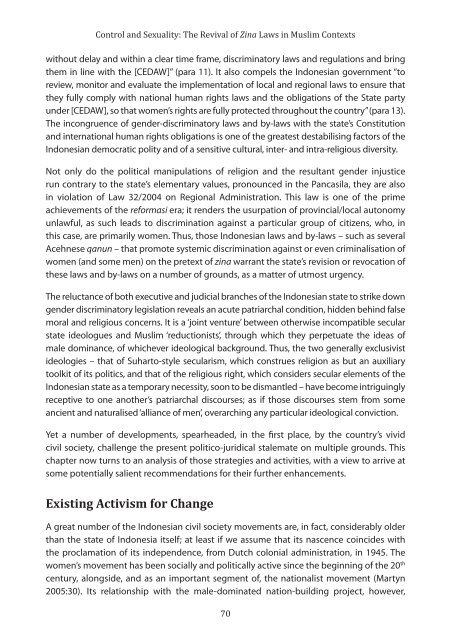control and sexuality
control and sexuality
control and sexuality
- No tags were found...
Create successful ePaper yourself
Turn your PDF publications into a flip-book with our unique Google optimized e-Paper software.
Control <strong>and</strong> Sexuality: The Revival of Zina Laws in Muslim Contextswithout delay <strong>and</strong> within a clear time frame, discriminatory laws <strong>and</strong> regulations <strong>and</strong> bringthem in line with the [CEDAW]” (para 11). It also compels the Indonesian government “toreview, monitor <strong>and</strong> evaluate the implementation of local <strong>and</strong> regional laws to ensure thatthey fully comply with national human rights laws <strong>and</strong> the obligations of the State partyunder [CEDAW], so that women’s rights are fully protected throughout the country” (para 13).The incongruence of gender-discriminatory laws <strong>and</strong> by-laws with the state’s Constitution<strong>and</strong> international human rights obligations is one of the greatest destabilising factors of theIndonesian democratic polity <strong>and</strong> of a sensitive cultural, inter- <strong>and</strong> intra-religious diversity.Not only do the political manipulations of religion <strong>and</strong> the resultant gender injusticerun contrary to the state’s elementary values, pronounced in the Pancasila, they are alsoin violation of Law 32/2004 on Regional Administration. This law is one of the primeachievements of the reformasi era; it renders the usurpation of provincial/local autonomyunlawful, as such leads to discrimination against a particular group of citizens, who, inthis case, are primarily women. Thus, those Indonesian laws <strong>and</strong> by-laws – such as severalAcehnese qanun – that promote systemic discrimination against or even criminalisation ofwomen (<strong>and</strong> some men) on the pretext of zina warrant the state’s revision or revocation ofthese laws <strong>and</strong> by-laws on a number of grounds, as a matter of utmost urgency.The reluctance of both executive <strong>and</strong> judicial branches of the Indonesian state to strike downgender discriminatory legislation reveals an acute patriarchal condition, hidden behind falsemoral <strong>and</strong> religious concerns. It is a ‘joint venture’ between otherwise incompatible secularstate ideologues <strong>and</strong> Muslim ‘reductionists’, through which they perpetuate the ideas ofmale dominance, of whichever ideological background. Thus, the two generally exclusivistideologies – that of Suharto-style secularism, which construes religion as but an auxiliarytoolkit of its politics, <strong>and</strong> that of the religious right, which considers secular elements of theIndonesian state as a temporary necessity, soon to be dismantled – have become intriguinglyreceptive to one another’s patriarchal discourses; as if those discourses stem from someancient <strong>and</strong> naturalised ‘alliance of men’, overarching any particular ideological conviction.Yet a number of developments, spearheaded, in the first place, by the country’s vividcivil society, challenge the present politico-juridical stalemate on multiple grounds. Thischapter now turns to an analysis of those strategies <strong>and</strong> activities, with a view to arrive atsome potentially salient recommendations for their further enhancements.Existing Activism for ChangeA great number of the Indonesian civil society movements are, in fact, considerably olderthan the state of Indonesia itself; at least if we assume that its nascence coincides withthe proclamation of its independence, from Dutch colonial administration, in 1945. Thewomen’s movement has been socially <strong>and</strong> politically active since the beginning of the 20 thcentury, alongside, <strong>and</strong> as an important segment of, the nationalist movement (Martyn2005:30). Its relationship with the male-dominated nation-building project, however,70


